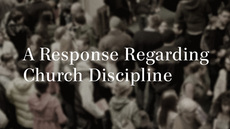From the March 11 sermon “Selfish Lovers and Servant Lovers,” preached by Pastor Mark Driscoll:
Jesus is the unselfish servant, but we are all selfish. Our selfishness is rooted in pride; we believe “I’m more important than you.” Proud people are selfish lovers, in and out of the bedroom (and most problems in the bedroom are the result of problems outside of the bedroom). Selfishness shows up in the “little things,” the little foxes that gnaw at and destroy the roots of the precious vine of a marriage. Are you proud and selfish, or are you a humble servant, by the grace of God?
Jesus says, “Whoever would be great among you must be your servant.” Oh. Well, there’s an upside-down world. There’s an upside-down world. But this is Jesus who got down and washed the dirty feet of Judas Iscariot, his enemy, who would betray and murder him. You want to be great? Jesus says to be a servant. You want to have a great marriage? Then be a great servant.
Mark 10:45, “The Son of Man,” that’s Jesus speaking of himself as God in human flesh, “came not to be—” what? “served but to serve, and to give his life as a ransom for many.” Jesus lived without sin. He died on the cross in our place for our sins. He rose for our salvation. That was all of humility. He served us through his suffering. This is amazing.
This is one of the reasons why people didn’t even think Jesus could be God. He’s humble, not proud. He’s poor, not rich. He serves others. He himself is not all about being served. And many rejected him and thought, “Well, certainly, this can’t be God. Because if I were God, that’s not how I would be.” That’s why we’re not God. We’re sinners, and God is holy. That means he’s different than we are. He’s humble. He’s humble.
He “came not to be served.” Let me ask you this. Going into marriage, is that your primary motivation?
So, we’re going to talk about pride. And I know some of you, you say, “Well, I don’t know about pride. What about self-esteem?” Pride! It’s just a cuter word for it. It’s marketing. Right? “Well, what about self-actualization?” Pride. “Well, shouldn’t you have a positive self-image?” I don’t know, pride. We found a clever way to make pride a virtue and not a vice.
The Bible says something very different about pride. In fact, I’ll share it with you, all right? So, put a helmet on. We’ll read these verses. Proverbs 8:13, “Pride and arrogance ... I hate.” Who says that? God, the Maker of heaven and earth, who knows your thoughts, words, deeds, and motives. That’s a scary verse. That’s a spooky verse. That’s a Scooby-Doo verse, right? That one’s troubling.
“I hate—” Some of you say, “What does ‘hate’ mean in Hebrew?” Uh, hate! He hates it. He really hates it. There’s a list of things here in this verse that God hates. One of them is pride. Are you proud?
All right, we’ll just keep going. All right, Proverbs 16:5, “Everyone who is arrogant in heart is an abomination to the LORD ; be assured, he will not go unpunished.” “What? But my teacher said I was like a snowflake. I’m one of a kind. I’m special! And I feel like I have a lot of potential, and deep down I’m a good person, and you don’t know my heart! And I need to have self-esteem so that I can live a good life!”
“Everyone who is arrogant in heart is an abomination to the LORD ; be assured, he will not go unpunished.” It’s being transformed by the renewing of your mind. It’s not taking what the world would tell you, going to the Scriptures and trying to find justification and vindication for it. It’s going to the Scriptures and getting the mind of God.
How does selfishness show up? Experience shows me that selfishness is oftentimes in the little things, the quote-unquote “little things.” Now, there’s a verse of the Bible that references this, the great love story, the Song of Songs 2:15. They talk about this issue. “Catch the foxes for us, the little foxes that spoil the vineyards.” [. . .]
The Song of Solomon says that your marriage is like a vine. You’ve got to prune it, and tend to it, and you’ve got to water it, and you’ve got to pull the weeds, and you’ve got to nurture it and keep in in healthy soil and environment, so that it can be fruitful, growing in love and service to God and others.
But there are little foxes that come in and gnaw at the vine toward the roots and can destroy the whole marriage, as a small animal would—to use the analogy—a very precious vine. See, your marriage is a very precious vine. What is that for you, those little foxes who get into your vineyard and gnaw at the roots? What is it? You say, “Well, it’s not a big thing.” But is it just gnawing away? Is it something they need to repent of, or you need to just let go of?
Now, a couple of things regarding being a servant versus selfish. Number one, if you have a child-centered home, you will think you’re serving your spouse because you’re serving your family. Okay? You’ll say, “No, no, I really do serve my spouse.” What do you mean? “Well, you know, I help with the kids, and I run them to Little League, and I do this around the house, and we have a good family, and I’m really committed to our family.”
This is a common Christian myth: “If I’m serving our children, if I’m serving our family, I’m serving my spouse.” Not necessarily. You can have a child-centered home that neglects the marriage, and this is why some couples, it looks like they’ve got this awesome family, maybe even this great Christian family. The kids grow up and leave, and it all falls apart for mom and dad. They got divorced. They committed adultery. They lived parallel lives. They don’t really like each other. They’re back-to-back or maybe shoulder-to-shoulder, but they’re not face-to-face with their friendship. You say, “What happened?” Oh, they were both serving the family. They were both serving the kids. Once the kids left, they didn’t have a relationship of servanthood toward one another.
Number two, some people have a business-centered marriage. They’re both serving the business. They’re in business together, working in the company, trying to make money. Are you a servant? “Oh, I’m totally a servant. I’m helping out. I’m helping the family business. I’m helping to generate revenue and income. Absolutely.” No, that’s different than serving your spouse. That’s shoulder-to-shoulder working with your spouse, but that’s not face-to-face serving your spouse.
And thirdly, some have a ministry-centered marriage, where there’s a lot of serving, but it’s for the purpose of ministry, not for marriage. This was the sin of Grace and me. [. . .] We were serving so many people that we weren’t serving one another well. So couples will use children, business, or ministry as idolatry to appear as humble servants when, in fact, they’re still selfish people, not caring for their spouse.
“I find it unrealistic that sex should be saved for after marriage. Shouldn’t we be sexually compatible?”
Grace: Well, the Scriptures tell us to be pure before marriage and keep the marriage bed pure, and [. . .]
“And do not awaken love before its time,” in Song of Solomon. There are lots of Scriptures that reference sexuality and keeping it in marriage. It’s the safe place for sexuality because it’s the most intimate thing you can do with someone. And to do that with someone that you’re not in covenant with is dangerous. It’s just not a safe thing, and God gives us those commands to protect us from putting ourselves in unsafe situations. Both emotionally and physically, there’s a lot of abuse in, like, couples that live together. There’s a high percentage of abuse with couples that are sexually active, living together. So, God knows the best way. He created it the best way and wants that for us because it protects us emotionally and physically. And it’s selfish to even want to take that from someone or participate in that with someone, if you don’t know that that’s going to be your spouse someday. [. . .]
Pastor Mark: And thirdly, if you don’t compare your spouse to others, how will you know if you’re not compatible? We had friends in college. I was a new Christian and had been sexually active before marriage, and then God saved me and changed my mind, and I’ll never forget this buddy of mine in college. He loved Jesus. He was a virgin. To me, that was like a unicorn. Like, I’d heard about them but I had never seen one. I didn’t know they were real. I thought these were mythical creatures. He had never kissed a girl, and he was engaged to be married.
And I remember he gave a lecture in, like, one of our classes, defending purity before marriage and chastity in marriage. And he said, “Now, I’m not going to kiss any woman until I kiss my wife when I say ‘I do’ on the altar.” And I thought, “That’s amazing.” Now, as a dad, I’m like, I hope he had sons, because I want them to meet my daughter. You know, like, I want her to marry somebody who cherishes and honors her like that and isn’t treating my daughter like, you know, some athlete in a competition to perform for a judge.
And then some frat guy raised his hand and joked and said, “Well, how do you know if she’s any good?” And his answer, my buddy’s answer was, “How will I know if she’s bad?” It’s like, “Yeah, good point.” “I have never had a piece of cake. This was my first piece of cake. Seems like a good cake.”
Grace: I think for a wife, she can be afraid of the responses that come when she’s willing to serve, not necessarily, I mean, it could be if a man is physically abusive, it could be that, but sometimes it’s just as simple as an emotional response that she may get from her husband or a rejecting response. And so she doesn’t want to continue to feel that, if she’s serving and doesn’t get a servant response. And so instead of taking that step of repentance, she’ll enable and just allow him to get away with his sins, but that’s not loving our spouse.
It doesn’t mean that we need to disrespectfully speak up against their sin. In fact, we’re told to be respectful as wives and to be helpers. And to be a helper would mean that we’re helping them to live like Christ, and so speaking respectfully, but honestly, and having regular conversations about it, so it’s not just blasting them all at once with things that you see in his life that are horrible, but, again, praying for a tone that’s right. Praying for the time that God has you to speak and the words he wants you to use, and then going forward and trusting, “Okay, I’m going to speak into this.”
And I think prefacing it with, “I do love you, and I’ve sinned against you, because I’ve seen these things, and I haven’t spoken up, and I’m sorry. And so I don’t want to attack you. I just want to address some of these things, because I think we’re hurting our marriage.” And just even talking about it in that way, showing that I’ve sinned against you by doing this, and opening the opportunity for him to see his sin against you.














